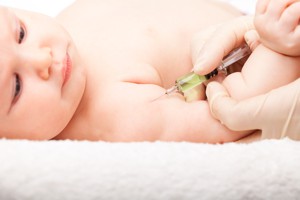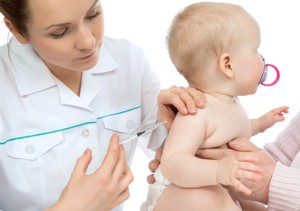 In the UK, all children are offered free vaccinations from a large number of life threatening illnesses, beginning at two-months old. These vaccinations offer protection from diseases that previously killed or maimed thousands of children each year. Thanks to the vaccination programme, and other advances in medicine, the UK now has one of the lowest infant mortality rates in the world.
In the UK, all children are offered free vaccinations from a large number of life threatening illnesses, beginning at two-months old. These vaccinations offer protection from diseases that previously killed or maimed thousands of children each year. Thanks to the vaccination programme, and other advances in medicine, the UK now has one of the lowest infant mortality rates in the world.
What Diseases Do The Vaccines Prevent?
This is a complete list of all of the diseases that are vaccinated against as part of the UK routine vaccination programme for children before secondary school age. This list was correct as of November 2015. Other diseases, such as Tuberculosis, may be vaccinated against if the child is considered to be at risk, whilst additional vaccines are also available for teenagers.
Diphtheria
A bacterial infection that affects the nose, throat, and skin with complications that include breathing difficulties, heart failure, and loss of bladder control. It is understood to be fatal in around 10% of cases.
Tetanus
A bacterial infection that occurs when bacteria found in soil and other places makes its way into the body via a wound. Symptoms can include muscle spasms, stiff jaw, breathing difficulties and cardiac arrest (heart failure).
Whooping Cough
A bacterial infection typically characterised by a persistent cough that is followed by the patient gasping for air with a “whooping” sound. In addition, the patient will have symptoms similar to that of the common cold. Complications include Pneumonia, seizures, kidney failure, and brain damage.
Polio
Largely eradicated in the Western world thanks to vaccinations, Polio is a virus spread through bodily fluids that for around 95% of cases has no symptoms at all. However, for some patients, symptoms are similar to flu and the disease can have long term effects such as muscle weakness, and limb deformities.
Haemophilus Influenzae Type B (Hib)
Hib is the name given to a type of bacteria that can cause a myriad of diseases, including meningitis, septicaemia (blood poisoning), pneumonia, and other infections that affect the heart, lung, joints, bones, and respiratory system. These are all very severe conditions that require a hospital stay and treatment with powerful antibiotics, with a risk of fatality.
Pneumococcal Infection
Streptococcus Pneumoniae is a type of bacteria that can cause what are referred to as Pneumococcal Infections. These infections can affect the blood, respiratory system, brain, and spinal chord, that can lead to serious complications, including death.
Rotavirus
Rotavirus is a virus that causes diarrhoea and vomiting, and is common amongst young children. A vaccine was introduced in the UK in 2013 leading to a 70% decrease in recorded cases of the bug. The virus spreads rapidly, and whilst it can be relatively harmless in the majority of cases, one in ten children who have the bug will require hospital treatment, and there are a small number of fatalities each year.
Meningitis B & C
Meningitis B & C are bacterium that can cause the diseases Meningitis, which affects the brain and spinal chord, and Septicaemia, which affects the blood. Although the bacteria can infect at any age, children are most at risk of developing Meningitis. Along with severe flu like symptoms and a rash, Meningitis can result in hearing and vision loss, speech problems, and cognitive impairment including memory problems and learning difficulties. It can also be fatal.
Measles
Measles is a disease caused by a virus that is spread via bodily fluids that include those that come from sneezing and coughing. The virus can live for several hours outside of the body, so it is possible to pick it up from contaminated surfaces. The disease presents as a cold-like illness with a high fever and a rash and most people will make a full recovery. However, measles can result in complications such as respiratory infections, liver infection (Hepatitis) and nerve damage resulting in blindness. Some cases can also be fatal.
Mumps
As with measles, mumps is caused by a virus that lives in body fluids such as saliva, and can be transmitted via droplets spread by people coughing and sneezing. Along with joint aches, headaches, and fever, the disease causes a distinctive swelling of the parotid glands that are located at the side of your face. Whilst the disease normally passes without complication, it can cause viral meningitis, pancreatitis, and swelling of ovaries and testicles.
Rubella (German Measles)
This virus is spread through body fluids including those expelled by coughing and sneezing. The virus results in cold like symptoms, a rash, and swollen glands. Whilst it generally causes very few complications, it can be very harmful if contracted by a pregnant woman, resulting in serious birth defects or miscarriage.
Flu
Flu is one of the most common viral illnesses experienced in the UK and results in cold like symptoms, fever, aches and pains, and extreme tiredness. For most people, flu lasts around a week and does not require treatment. However, the very young, the elderly, pregnant women, and those with other medical complications are at risk of developing complications including additional respiratory infections, seizures, and meningitis.
When Will My Baby Receive Vaccinations Against These Diseases?
 The NHS has a set immunisation schedule for children to receive vaccinations and boosters against the above diseases. The schedule is as follows:
The NHS has a set immunisation schedule for children to receive vaccinations and boosters against the above diseases. The schedule is as follows:
Two Months Old
- First “5 in 1” vaccine, also known as DTaP/IPV/Hib, for Diphtheria, Tetanus, Whooping Cough (Pertussis), Polio, and Hib
- Pneumococcal or Pneumo vaccine (PCV) – For Pneumococcal Infections
- Rotavirus vaccine
- Meningitis B vaccine
Three Months Old
- Second “5 in 1” / DTaP/IPV/Hib vaccine
- Second Rotavirus vaccine
- Meningitis C vaccine.
Four Months Old
- Third “5 in 1” / DTaP/IPV/Hib vaccine
- Second Meningitis B vaccine
- Second Pneumococcal or Pneumo vaccine (PCV)
12 Months Old
- Hib / Meningitis C Booster
- MMR vaccine – for Measles, Mumps, and Rubella
- Third Pneumococcal or Pneumo vaccine (PCV)
- Third Meningitis B vaccine
Two Years Old
- Flu Nasal Spray – Offered each year in September / October for two, three, and four year olds through GP surgeries, as well as in primary schools for children in year one and year two.
Three Years and Four Months Old
- “4 in 1” booster, also known as the DTaP/IPV Pre-School booster, for Diphtheria, Tetanus, Whooping cough and Polio.
Are These Vaccinations Safe For My Baby?
Each vaccination undergoes rigorous testing before it is offered to members of the public. Information is collected by the NHS on any side effects on an on-going basis and used to monitor safety. Whilst many children do experience mild side effects, such as fever, swelling in the area where the needle was placed, and rashes, these tend to be short lived and can be treated at home with infant paracetamol.
Other, more serious side effects are incredibly rare, and often a result of allergies to one of the added ingredients, such as egg or gelatin. However, the risk of this happening is very low, especially when compared to the risks associated with contracting one of the diseases that vaccines prevent.
Vaccinations & Autism: A Myth
There is a common misconception that vaccinations, particularly the MMR vaccination, can cause autism to develop in children. This is because in 1998 Dr Andrew Wakefield published a study that indicated that there was a link between the MMR jab and autism. However, Dr Wakefield’s research was later found to be largely falsified, and his methods led to charges being brought against him for abuse of vulnerable children.
In addition, further investigations found that Dr Wakefield was financially motivated, with a plan to launch a new business offering medical tests for parents worried about the fact that their children had received the vaccine. Andrew Wakefield has since been struck off the General Medical Council’s register and since his paper was published there have been a myriad of studies that demonstrate that there is no link between autism and vaccines. Unfortunately, due to the nature of autism, the condition is often diagnosed after a child has received vaccinations, which is why many parents still fear this link.
However, many parents of autistic children report that with hindsight, there were subtle signs that their baby was not developing normally from an early age, but that these were dismissed as being part of normal new-born behaviour. If you have any concerns about your child’s vaccinations, please discuss them further with a qualified medical professional, such as your child’s health visitor or GP.
